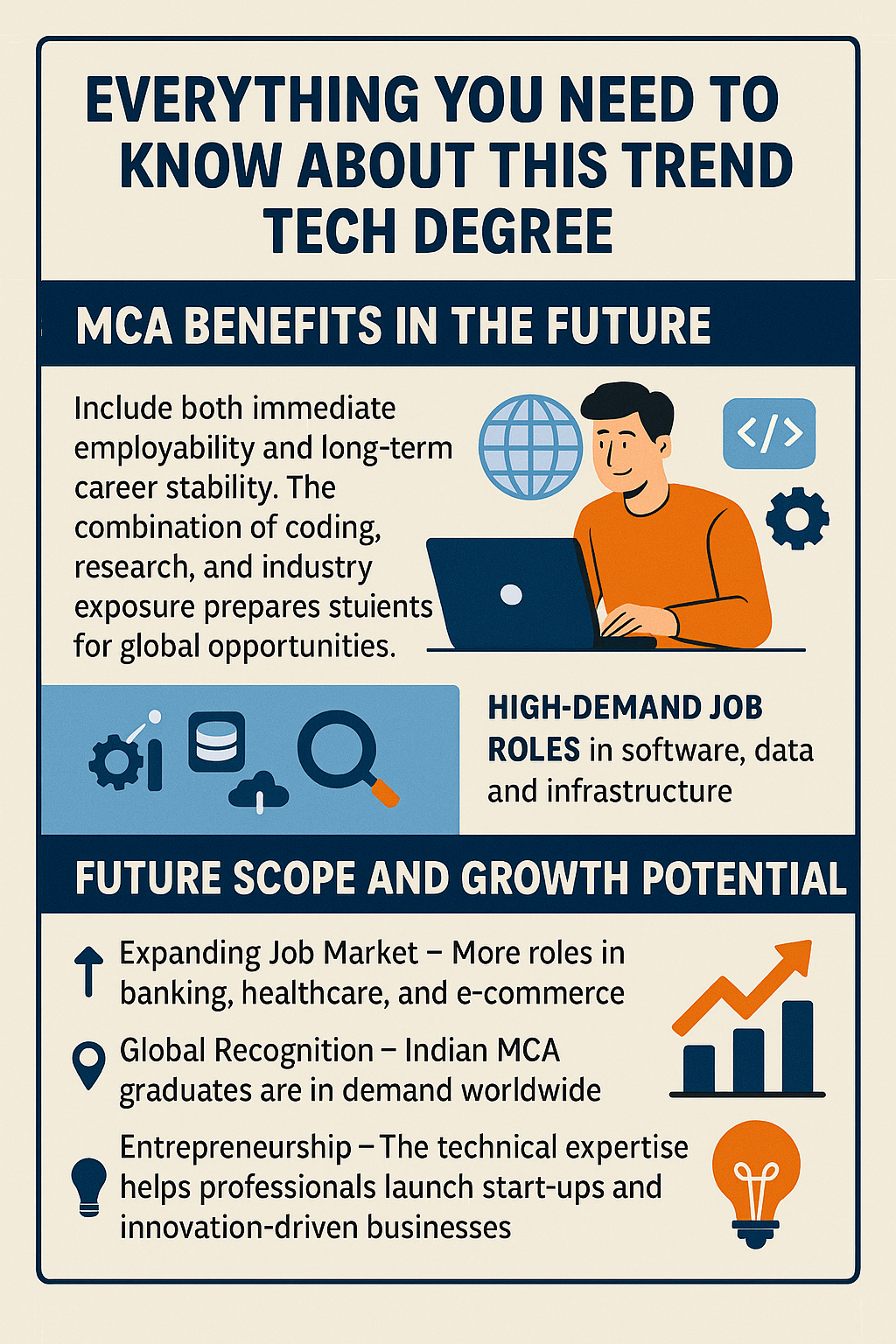
The Master of Computer Applications (MCA) is one of the most popular postgraduate programs for those aiming to build a strong career in the IT industry. In today’s digital economy, companies across healthcare, banking, retail, and education rely heavily on technology for growth and innovation.
An MCA program offers the benefits of MCA by equipping students with advanced programming, software development, and system design skills. These abilities make graduates capable of meeting the rising global demand for tech professionals.
At its core, MCA is a career-focused degree that blends theoretical learning with practical application. Students learn to design and manage applications, IT systems, and digital solutions used across businesses.
This focus highlights the MCA course benefits, as learners not only develop technical expertise but also gain problem-solving, critical thinking, and leadership abilities. These traits are crucial in solving complex IT challenges.
The program usually runs for two years (four semesters), though some universities extend it to three years for students without a computer science background. Each semester balances theory, labs, and project work.
This structure ensures that the MCA benefits in future include both immediate employability and long-term career stability. The combination of coding, research, and industry exposure prepares students for global opportunities.
The MCA curriculum covers a wide range of technical topics, including programming languages, databases, operating systems, networking, AI, and cloud computing. Practical projects ensure real-world readiness.
Learning these diverse topics highlights the benefits of MCA course, as students gain knowledge across multiple areas of computer science while developing specialised expertise in emerging technologies.
Applicants must hold a bachelor’s degree with at least 50% marks and should have studied Mathematics either at 10+2 or at the undergraduate level. Candidates from non-computer backgrounds may be offered bridge courses.
Meeting these entry requirements reflects one of the MCA advantages—the degree welcomes students from varied academic streams while ensuring they develop the required technical foundation.
An MCA degree provides multiple advantages, making it a smart career choice for IT aspirants.
With the rise of flexible education, many students and working professionals are now enrolling in online MCA course options. These programs offer the same credibility as regular MCA while making learning more accessible.
Graduates have a wide range of job opportunities after MCA, reflecting the high demand for skilled professionals across industries.
New domains are also opening doors for MCA graduates:
These MCA benefits in the future highlight the evolving scope of the degree in cutting-edge fields.
An MCA degree not only builds technical expertise but also shapes essential professional skills.
The IT industry in India is expanding rapidly, driven by government initiatives like Digital India and global demand for skilled talent.
The MCA benefits in future include:
When evaluating postgraduate options, comparing MCA with MBA and M.Sc IT is important.
| Degree | Focus Area | Best Suited For |
|---|---|---|
| MCA | Software development, IT systems, and application design | Students aiming for technical careers |
| MBA | Business management, leadership, and corporate strategy | Professionals seeking managerial growth |
| M.Sc IT | Theoretical, research-based computer science | Students focused on research or academia |
The MCA degree continues to be one of the strongest postgraduate qualifications for aspiring IT professionals. The benefits of the MCA course include access to diverse careers, global recognition, and long-term career stability.
By offering a blend of technical training, real-world exposure, and global career opportunities, MCA prepares students for future-ready roles. Whether pursued in a traditional classroom or as an online program, the advantages of MCA make it a smart investment in 2025.
This program prepares you for higher-level roles by providing a strong foundation in technology and problem-solving. It helps you gain the expertise required to manage complex projects, lead teams, and work on innovative solutions across industries. Many organisations also prefer candidates with a postgraduate degree for leadership and specialised positions, giving you a competitive edge in the job market.
You will develop a blend of technical, analytical, and soft skills. These include programming abilities, project management, logical reasoning, and data handling expertise. The program also helps you build strong communication and teamwork capabilities, which are essential for working in collaborative, technology-driven environments.
The demand for technology professionals continues to grow as businesses rely more on digital systems and solutions. In the coming years, there will be increasing opportunities in areas like cloud platforms, data analysis, cybersecurity, and automation. This ensures that graduates will have a wide range of options to pursue both domestically and internationally.
While having a background in computer science or related fields is helpful, it is not always mandatory. Many universities offer foundation courses or preparatory modules to help students from other academic streams catch up with essential concepts before diving into advanced subjects.
The typical duration is two years, divided into four semesters. Some universities may offer an extended three-year track for learners from non-technical backgrounds, giving them more time to build foundational knowledge before advancing to complex topics.
Yes, many universities offer flexible learning options, including online classes and weekend sessions. These formats are designed for working professionals, allowing them to balance their education with job responsibilities without compromising either.
Our counselling team is ready to assist you at every step — click the button below to get started.
Need advice? Our experts are on WhatsApp 24/7—message us anytime!